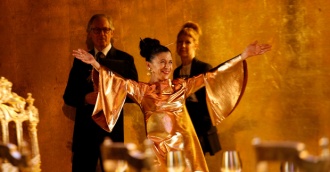This is the last article you can read this month
You can read more article this month
You can read more articles this month
Sorry your limit is up for this month
Reset on:
Please help support the Morning Star by subscribing here
Timon of Athens
The Swan Theatre
Stratford-upon-Avon
UNSURPRISINGLY, Timon of Athens is one of Shakespeare's least performed plays. With its schematic structure and simple message that money is the root of all evil, it's virtually the Bard's one attempt at agit-prop drama.

The play's stage success depends essentially on the actor playing Timon. (S)he must make us believe in a real human being who can convince as the naively benevolent obsessive of the play's first half while mutating into the malevolent misanthrope of the second.
The RSC has hit the jackpot on all counts, with director Simon Godwin not only recognising that the play is essentially a play for the moment, he has also found an inspired Timon in Kathryn Hunter.
She's fired by an almost demonic delight in piling gifts onto her grasping neighbours who we know will reject her need for help when she inevitably finds herself bankrupt.
With her expressively saturnine face, there's a wealth of energy packed into her diminutive frame and that same energy that feeds her magnanimity easily transmutes into a self-destructive malevolence as she delivers a litany of curses upon mankind, despairing of “my long life of health and living.”
Throughout, Godwin freezes the action to have Nia Gwyn's cynical philosopher Apemantus comment on Timon's self-beguiling view of a world where money reduces humanity to a commodity. “The middle of humanity thou never knewest, but the extremity at both ends,” she berates her.
There are subtle reminders of the Brexit crisis, as when Patrick Drury's silver-haired steward warns the bewildered Timon that “the future comes apace” and that the Athenian Council has answered his plea for help “in a joint and corporate voice.” We know where we are.
Designer Soutra Gilmour sets the action in a golden world of bouzouki music and excessive entertainment that degenerates into the rubbish tip where a destitute Timon survives, ironically finding hoarded gold which she uses to corrupt even the yellow-vested campaigners against the criminality of usury.
Marx's favourite play is here presented as a powerfully entertaining dramatic cartoon treatment of his theoretical analysis of our world's ills.
Runs until February 22: box office rsc.org.uk.








